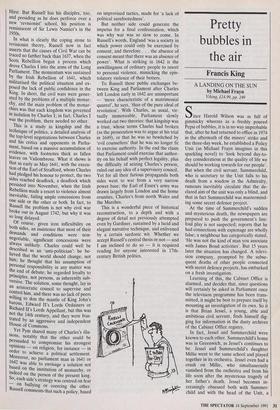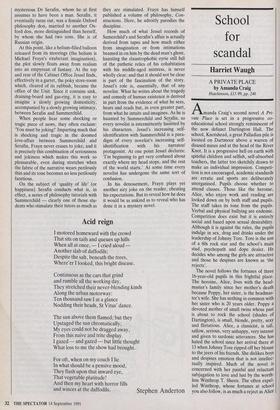Pretty bubbles in the air
Francis King
A LANDING ON THE SUN by Michael Frayn
Viking, f14.99, pp. 249
Since Harold Wilson was as full of gimmicky wheezes as a freshly poured Pepsi of bubbles, it is in no way improbable that, after he had returned to office in 1974 in the aftermath of the miners' strike and the three-day week, he established a Policy Unit (as Michael Frayn imagines in this sparkling novel) to 'look beyond day-to- day considerations at the quality of life we should be working towards for our people'. But when the civil servant, Summerchild, who is secretary to the Unit falls to his death from a window in the Admiralty, rumours inevitably circulate that the de- clared aim of the unit was only a blind, and that in fact Summerchild was mastermind- ing some secret defence project.
At the time of Summerchild's sudden and mysterious death, the newspapers are prepared to push the government's line: foul play is not suspected; reports that he had connections with espionage are wholly false; a neighbour has categorically stated, `He was not the kind of man you associate with James Bond activities'. But 15 years later the situation has changed. A televi- sion company, prompted by the subse- quent deaths of other people connected with secret defence projects, has embarked on a fresh investigation.
Learning of this, the Cabinet Office is alarmed, and decides that, since questions will certainly be asked in Parliament once the television programme has been trans- mitted, it might be best to prepare itself by mounting an investigation of its own. So it is that Brian Jessel, a young, able and ambitious civil servant, finds himself dig- ging for information in the dusty archives of the Cabinet Office registry.
In fact, Jessel and Summerchild were known to each other. Summerchild's home was in Greenwich, as Jessel's continues to be. Jessel and Summerchild's daughter Millie went to the same school and played together in its orchestra. Jessel even had a crush on Millie, who simultaneously vanished from the orchestra and from his life soon after the mysterious tragedy of her father's death. Jessel becomes in- creasingly obsessed both with Summer- child and with the head of the Unit, a mysterious Dr Serafin, whom he at first assumes to have been a man. Serafin, it eventually turns out, was a female Oxford philosophy don, married to another Ox- ford don, more distinguished than herself, by whom she had two sons. She is of, Russian origin.
At this point, like a helium-filled balloon released from its moorings (the helium is Michael Frayn's exuberant imagination), the plot slowly floats away from realism into an empyrean of fantasy. At the top and rear of the Cabinet Office. Jessel finds, effectively in a garret, the poky store-room which, cleared of its rubbish, became the office of the Unit. Since it contains sink, draining-board and gas-ring, it is easy to imagine a slowly growing domesticity, accompanied by a slowly growing intimacy, between Serafin and Summerchild.
When people hear some shocking or tragic piece of news, they often exclaim:. `You must be joking!' Imparting much that is shocking and tragic in the doomed love-affair between Summerchild and Serafin, Frayn never ceases to joke; and it is precisely this combination of seriousness and jokiness which makes this work so pleasurable, even during stretches when the fabric of the narrative wears perilously thin and its tone becomes no less perilously facetious.
On the subject of 'quality of life' (or happiness) Serafin conducts what is, in effect, a series of philosophy tutorials with Summerchild — clearly one of those stu- dents who stimulate their tutors as much as they are stimulated. Frayn has himself published a volume of philosophy, Con- structions. Here, he adroitly parodies the discipline.
How much of what Jessel records of Sumerchild's and Serafin's affair is actually derived from tapes and how much either from imagination or from intimations beamed in on him by the dead man's ghost, haunting the claustrophobic eyrie still full of the pathetic relics of his cohabitation with his middle-aged mistress, is never wholly clear; and that it should not be clear is part of the fascination of the story. Jessel's role is, essentially, that of any novelist. What he writes about the tragedy and comedy of human existence is derived in part from the evidence of what he sees, hears and reads but, in even greater part, from what he intuits and imagines. As he is haunted by Summerchild and Serafin, so every novelist is intermittently haunted by his characters. Jessel's increasing self- identification with Summerchild is a para- digm of every novelist's increasing self- identification with his narrator/ protagonist. At one point Jessel declares: `I'm beginning to get very confused about exactly where my head stops, and the rest of the world starts.' At some time every novelist has undergone the same sort of confusion.
In his denouement, Frayn plays yet another airy joke on the reader, cheating his expectations. But to reveal how he does it would be as unkind as to reveal who has done it in a mystery novel.



















































 Previous page
Previous page